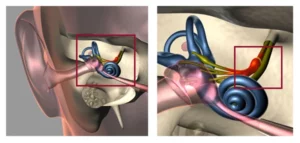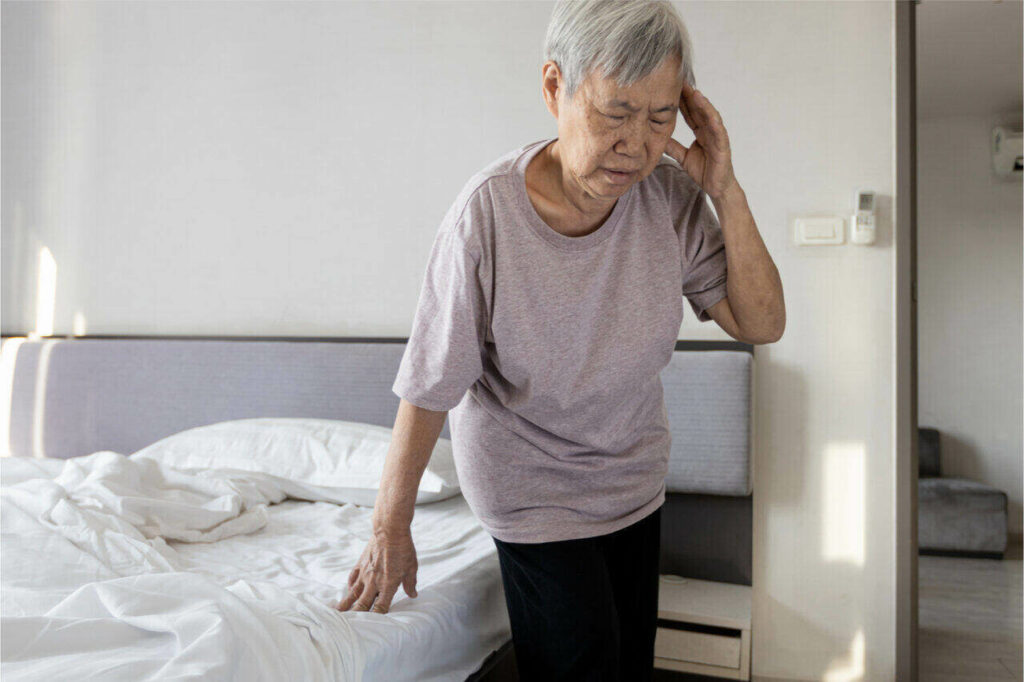Vertigo can be a debilitating condition, particularly if it affects the elderly. In this blog post, we will discuss the different causes of vertigo in seniors and the various treatment options available. If you are caring for an elderly loved one who is suffering from vertigo, it is important to be aware of these potential causes and treatments so that you can help them get relief as soon as possible.
Contents
What Is Vertigo?
 Vertigo is a feeling of dizziness and spinning. It is commonly caused by a problem with the inner ear, but can also be caused by other conditions. There are two types of vertigo: central and peripheral. Central vertigo is caused by a problem in the brain, while peripheral vertigo is caused by a problem in the inner ear.
Vertigo is a feeling of dizziness and spinning. It is commonly caused by a problem with the inner ear, but can also be caused by other conditions. There are two types of vertigo: central and peripheral. Central vertigo is caused by a problem in the brain, while peripheral vertigo is caused by a problem in the inner ear.
It is believed that most cases of vertigo are actually peripheral vertigo. According to studies, about 80% of people with vertigo have peripheral vertigo. It is important to understand this condition to help alleviate symptoms and keep vertigo from recurring.
Also, if you are experiencing vertigo, it is important to see a healthcare professional to rule out any other serious conditions. Let’s further discuss the causes of vertigo in the elderly!
What Causes Vertigo In The Elderly?
There are many different causes of vertigo in the elderly. Let’s discuss a few of the most common causes.
Benign Paroxysmal Positional Vertigo (BPPV)
One of the most common causes of vertigo in the elderly is Benign Paroxysmal Positional Vertigo (BPPV). BPPV is caused by a change in the position of your head, such as when you turn over in bed or tilt your head up or down. This can cause tiny calcium crystals in your inner ear to become dislodged and float into one of the fluid-filled canals. When this happens, you may feel like you are spinning or that your surroundings are spinning around you.
BPPV is usually not a serious condition and can be treated with a simple procedure called the Epley maneuver. This maneuver involves moving your head into different positions to help the calcium crystals move back into place.
Vestibular Neuritis/Labyrinthitis
 Another common cause of vertigo in the elderly is vestibular neuritis or labyrinthitis. These conditions are caused by an inflammation of the inner ear or the nerves that connect the inner ear to the brain. The most common symptom of both vestibular neuritis and labyrinthitis is severe dizziness or a spinning sensation that comes on suddenly and lasts for several days.
Another common cause of vertigo in the elderly is vestibular neuritis or labyrinthitis. These conditions are caused by an inflammation of the inner ear or the nerves that connect the inner ear to the brain. The most common symptom of both vestibular neuritis and labyrinthitis is severe dizziness or a spinning sensation that comes on suddenly and lasts for several days.
Other symptoms may include nausea, vomiting, sweating, and a feeling of fullness in the ear. In most cases, vestibular neuritis and labyrinthitis are self-limiting and will resolve on their own within a few weeks. However, some cases may require treatment with vestibular rehabilitation or medications to help relieve symptoms.
Ménière’s Disease
Ménière’s disease is another common cause of vertigo in the elderly. This condition is characterized by episodes of vertigo that last for several hours, as well as hearing loss and a feeling of fullness in the affected ear. While there is no cure for Ménière’s disease, treatments can help to manage the symptoms and reduce the frequency of episodes.
More often, this condition is caused by a buildup of fluid in the inner ear. This can be due to a number of factors, including blockage of the ear’s drainage channels, allergies, or viral infections. In some cases, Ménière’s disease may also be caused by changes in the pressure of the fluid in the inner ear.
Abnormal Regulation of BP
If you are an elderly person, then you might suffer from a condition known as abnormal regulation of blood pressure. This is one of the most common causes of vertigo in elderly people. When your blood pressure gets too low or too high, it can cause a sudden drop in blood flow to your brain. This can lead to dizziness and lightheadedness.
There are a few things that can cause your blood pressure to fluctuate. One of them is dehydration. If you are not drinking enough fluids, then your blood pressure can drop. Another thing that can cause your blood pressure to fluctuate is an electrolyte imbalance.
Certain medicines
 This is a condition that can be caused by different things. For elderly people, one of the most common causes is a change in their medication. As we age, our bodies process medications differently than when we were younger. What may have been a safe and effective dose for us in our youth can now cause problems, including vertigo.
This is a condition that can be caused by different things. For elderly people, one of the most common causes is a change in their medication. As we age, our bodies process medications differently than when we were younger. What may have been a safe and effective dose for us in our youth can now cause problems, including vertigo.
If you are experiencing sudden vertigo, it is important to speak with your doctor about any medications you are taking and whether a different dose or medication might be better for you.
All in all, these are a few causes of vertigo in the elderly. Remember that if you are experiencing vertigo, it is best to speak with a doctor to rule out any serious underlying conditions. They can also help you find the best way to treat your vertigo and get you back on your feet.
How Can You Treat Vertigo In Elderly?
It is important to see your GP if you think you have vertigo. You will need to describe your symptoms and how often you have them. Your GP will ask about your medical history and carry out a physical examination. They may also arrange for you to have a brain scan or other tests.
There are several treatment options available for vertigo in the elderly. Your GP can advise you on the best option for you. The most common treatment options are:
Canalith repositioning manoeuvres
These are a series of simple movements that are carried out by a trained healthcare professional. They are designed to move the otoconia back into their correct position in your ear. It works best if it is carried out within 48 hours of the vertigo starts.
Medication
There are a number of different types of medication that can be used to treat vertigo in the elderly. These include:
- Anti-emetics – to help control nausea and vomiting
- Anticholinergics – to help reduce dizziness and vomiting
- Benzodiazepines – to help relieve anxiety and improve sleep
- Corticosteroids – to help reduce inflammation
- Diuretics – to help reduce fluid retention
- Vasodilators – to help improve blood circulation
The type of medication that will be most effective for an elderly person suffering from vertigo will depend on the underlying cause of the condition. For example, if the vertigo is caused by an inner ear infection, then antibiotics may be prescribed. If the vertigo is caused by a problem with the nervous system, then medication to help control anxiety or improve sleep may be recommended.
Physical Therapy
Another treatment option for vertigo in the elderly is physical therapy. A physical therapist can help to improve balance and coordination, as well as teach exercises to help reduce the symptoms of vertigo. In some cases, vestibular rehabilitation may also be recommended. This is a type of physical therapy that is specifically designed to help retrain the brain to better process information from the vestibular system.
There are some examples of physical therapy that you can try at home to help reduce the symptoms of vertigo. One is the Epley maneuver, which involves lying down on your back and then turning your head to the affected side. Another is the Brandt-Daroff exercise, which involves sitting up and then lying down on your affected side.
Self-care
 There are a few things you can do at home to help ease your vertigo symptoms. Try these tips:
There are a few things you can do at home to help ease your vertigo symptoms. Try these tips:
- Get plenty of rest.
- Drink lots of fluids, especially water.
- Avoid alcohol and caffeine.
- Move slowly and carefully. When you get up from a lying or sitting position, sit up slowly and then stand up slowly.
- Don’t smoke.
If you’re having a vertigo attack, try these measures:
- Sit or lie down and close your eyes. Try to relax.
- Take slow, deep breaths. Inhale and exhale slowly and deeply through your nose.
- Try over-the-counter medications. If you often have attacks, ask your doctor if a prescription might help.
- Try vestibular rehabilitation therapy. A specially trained therapist can help you retrain your balance system with exercises and other activities.
These are some treatment options for vertigo in the elderly, it can be difficult to cope with the symptoms. But with the right care plan, it is possible to manage vertigo and improve your quality of life.
If you or a loved one are struggling with vertigo, don’t hesitate to reach out to a doctor or vertigo specialist for help. With the right treatment, vertigo can be managed and life can go on.
Conclusion
To conclude, the causes of vertigo in elderly can be various. However, the most common ones are Benign Paroxysmal Positional Vertigo (BPPV), Meniere’s disease, Vestibular Neuritis, and Labyrinthitis. These conditions can be treated with various options so you need to consult your doctor to see which one is the most suitable for you. With proper treatment, vertigo can be managed and you can continue living your life without much trouble.
Physical Therapy help patients recover from pain. If you’re experiencing Back pain, Shoulder pain, Knee pain, Neck pain, Elbow pain, Hip pain, or Arthritis pain, a physical therapist at MantraCare can help: Book a physiotherapy session.


